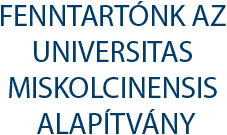MA in International Relations
CURRICULUM COURSE DESCRIPTION CV OF LECTURERS INFORMATION GUIDE
|
FACULTY |
Faculty of Humanities and Social Sciences |
|
STUDY PROGRAMME |
International Relations |
|
QUALIFICATION |
International Relations Expert |
|
LEVEL |
MA |
|
APPLICATION PERIOD |
2025/26 Autumn intake: 1 October 2024 - 15 June 2025 |
|
DURATION |
4 semesters |
|
TEACHING MODE |
on-site |
|
LANGUAGE REQUIREMENTS |
English (IELTS 6.0 or equivalent )
|
|
ACADEMIC REQUIREMENTS |
Bachelor or Master in Social or Human Sciences |
|
ECTS CREDITS TO COLLECT |
120 |
|
TUITION FEE |
2500 EUR/semester |
|
OTHER FEES |
150 EUR application fee |
|
LECTURE, SEMINAR - PRACTICE |
60% (lecture) /40% (seminar, practice) |
SHORT DESCRIPTION: The purpose of the training is to train experts who have adequate theoretical knowledge and are able to analyze the trends of the current international political and economic conditions.
They are prepared – based on their knowledge on international economic, international legal and international relations theories, regional-civilizational interdisciplinary knowledge, as well as based on their professional language skills - to understand the connections of the globalizing international system. They are capable for a deeper analysis of the economic, political and social contexts of a given region. They are prepared to continue their studies in doctoral training.
SPECIALIZATIONS:
- China and the South-East and Central Asian region
- Central Europe (Nations and Minorities)
- Climate Change, Sustainability and Deep Adaptation
ENTRANCE EXAMINATION:
Requisites of admission:
Any kind of BA or BSc (or equivalent) diploma, preferably in the social sciences, law or economics and a good command of English, written and spoken, proofed by a language certificate B2 or higher) of any kind, or a certificate of study conducted in English.
Evaluation criteria:
- BA degree (max. 40 points)
- competency in the academic literature of International Relations (max. 40 points)
- motivation, future plans (max. 20 points)
During the 20–30-minute online admission interview, the applicant’s social science knowledge, research interests and motivation, commitment to study on international relations issues and language proficiency is assessed.
Successful candidates are to be able to answer the following questions on their professional backgrounds, and motivations:
1. What are the reasons and their motivations for applying to study on this programme in a Central European city?
2. What do they know and what knowledge do they want to gain about international relations?
3. What do they want to achieve with the Master?
4. On what kind of fields do they want to acquire knowledge regarding international relations? What are their research interests at present?
5. How and where do they envision to apply their knowledge after graduating?
Final Evaluation:
Applicants can score a maximum of 100 points. Applicants who score at least 80 points will be admitted to the MA program. Applicants who score less than 80 points will be rejected.
CAREER PROSPECTS:
Our master's degree students can be employed in areas where they have to creatively and proactively solve diverse professional tasks, especially in the field of building and maintaining international relations. With a diploma in international relations, they will be able to use their theoretical, practical and foreign language knowledge acquired during the training in the most effective way, adapting to the political, economic and ecological challenges of the constantly changing, 21st century, global world.
In accordance with the three specializations of the course, they will be particularly suitable and prepared, on the one hand, from China and the South-East, respectively. to understand and analyze the political, economic, and cultural environment of Central Asian regions (learning the Chinese language at our university's Confucius Institute, which contributes to this during the training); on the other hand, for the study of Central Europe, with special regard to the ethnic and national minorities of the region (within particular emphasis is placed on the situation of Hungarians across the border); thirdly, the consequences of climate change, the issue of sustainability and a specific, new approach, the so-called "deep adaptation".
Most typical positions after graduation:
• Diplomat
• Government official
• Public official
• Analyst (in the fields of foreign affairs, foreign economy and national politics)
• China expert (in the public or private sector)
• Environmental protection expert (in the public or private sector)
• Researcher, scientific associate, doctoral student
• NGO employee
Meet STUDENT AMBASSADORS and ask STUDENTS from the faculty. Check testimonials or contact them!


